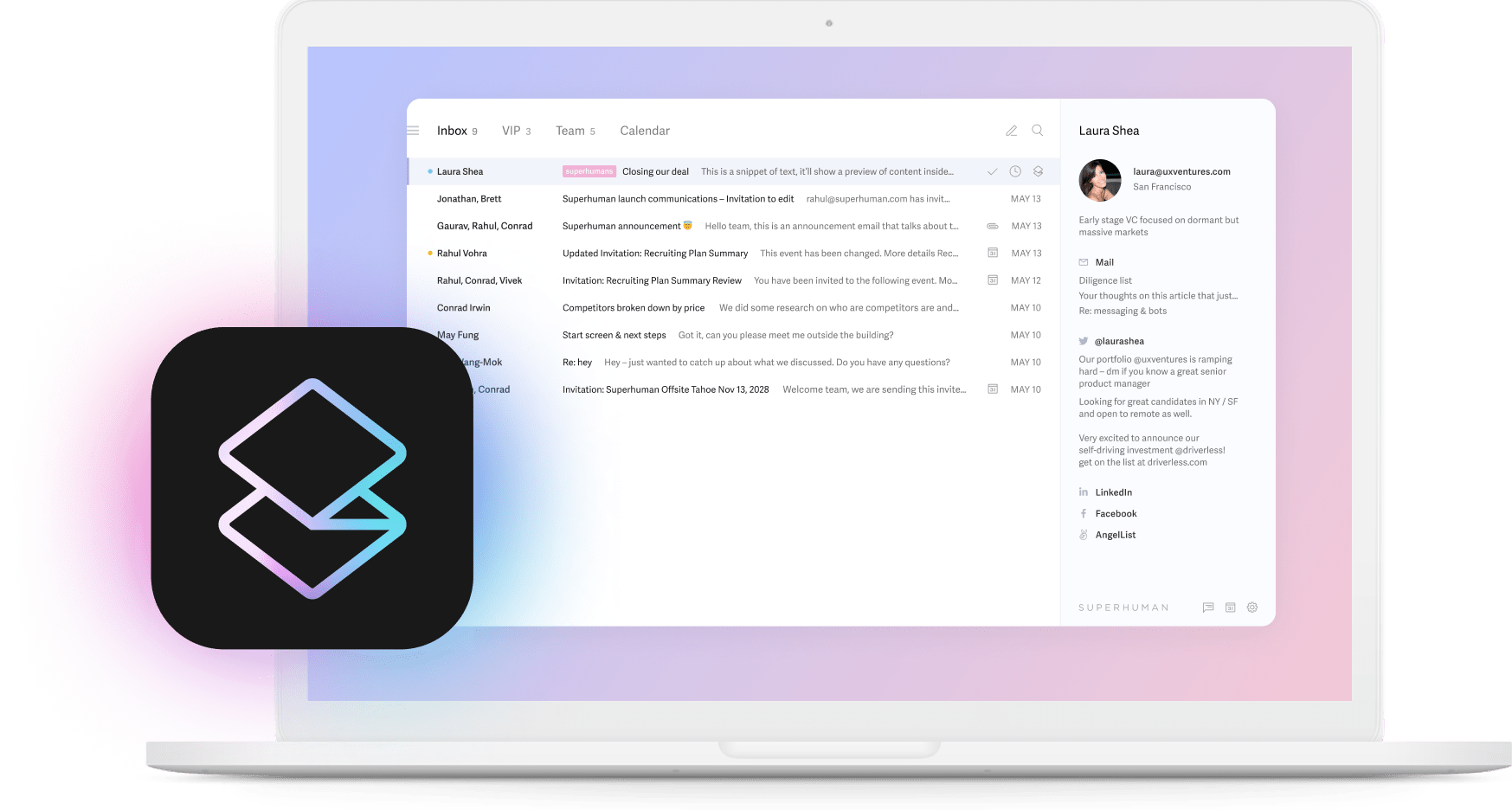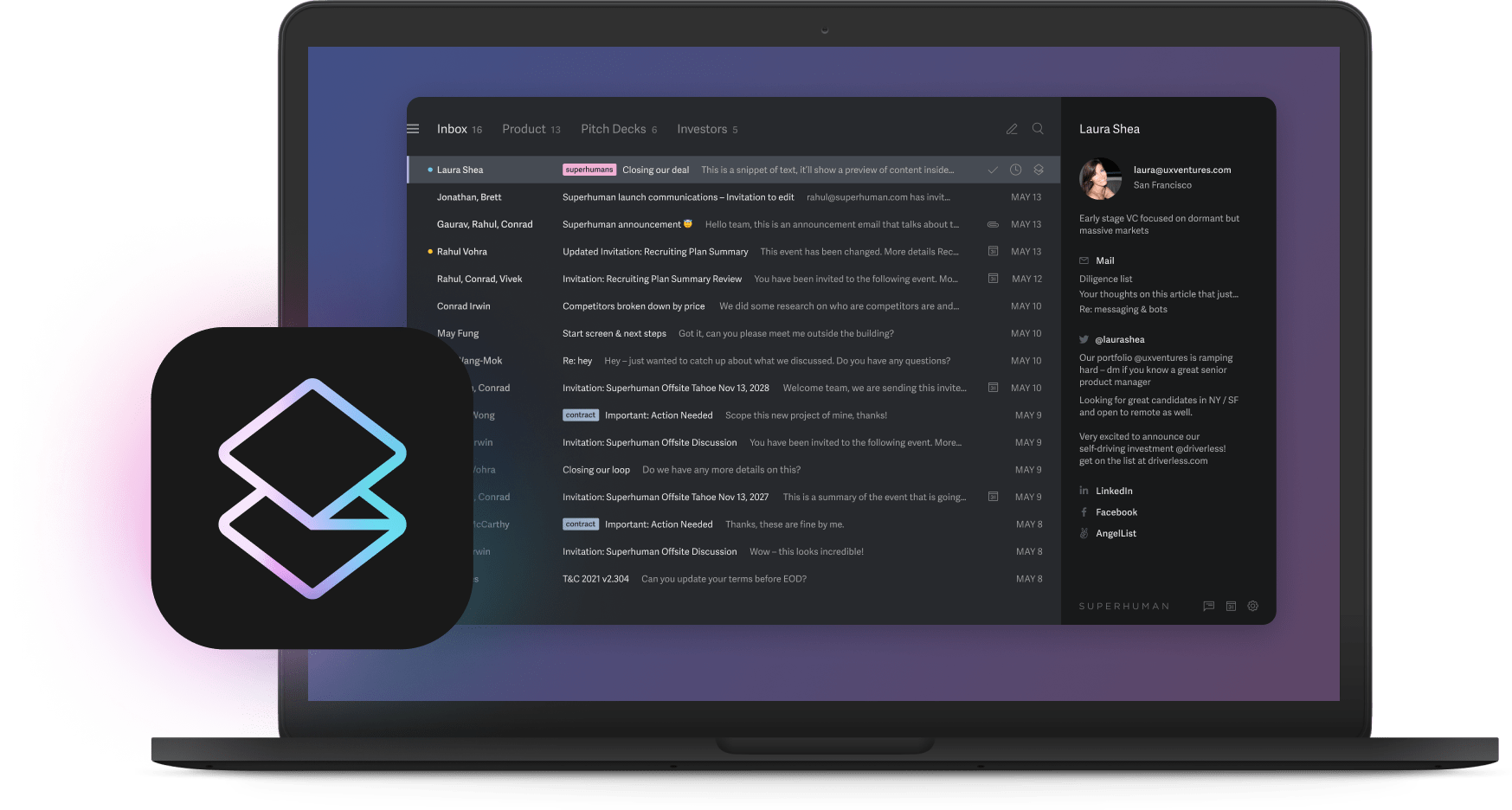
Right now, you probably have eight browser tabs open, three messaging apps running, and your inbox waiting for you to get back to it. Your to-do list keeps growing. Your team keeps asking where things are.
You're drowning in tools that promised to make work easier but instead made it more chaotic. This guide breaks down sixteen productivity tools that actually deliver on their promises—the ones that eliminate real bottlenecks, save measurable time, and help your team move faster without adding another layer of complexity to your workflow.
Business productivity solutions for communication and collaboration
Email and messaging sit at the center of everything your team does. When these tools work well, information flows smoothly. When they don't, everything slows down.
Superhuman Mail
How it works: Superhuman Mail works differently from traditional email clients. Every action happens in under 100 milliseconds, delivering the fastest email experience available. The platform learns from your writing history and communication patterns to provide AI-native assistance that maintains your authentic voice.
Key features:
- Split Inbox automatically organizes your messages so you see what matters first, emails from your team, executives, and critical tools like Google Docs or Asana rise to the top
- Superhuman AI learns from your writing history to draft complete emails in your voice
- Shared Conversations eliminate the mess of forwarding chains and BCC threads
- Read Statuses show exactly when someone opens your email, so you know when to follow up with confidence
- Snippets let you insert prewritten templates instantly and share effective replies across your team for consistent, on-brand communication
- Auto Summarize condenses long email threads into digestible summaries so you can catch up on conversations in seconds instead of minutes
- Keyboard Shortcuts power through your inbox in under 100 milliseconds per action, helping you hit Inbox Zero effortlessly
How it makes your team more productive: Teams using Superhuman Mail save 4 hours per person every week and respond 12 hours faster than teams using traditional email clients. You process emails twice as fast while maintaining the quality that keeps your reputation intact.
Slack
How it works: Slack organizes conversations into channels for different projects, teams, and topics. Direct messaging and video calling features handle one-on-one communications.
Key features:
- Channels organize conversations by topic, project, or team with public and private options
- Searchable message history with advanced filters for finding past conversations
- Threading keeps conversations organized within channels to reduce noise
- Huddles enable quick voice conversations directly in channels without formal meetings
- Workflow Builder creates custom automated workflows without coding
- Canvas feature provides dedicated spaces for persistent documentation and resources
How it makes your team more productive: Teams use Slack to reduce email volume for internal communications and coordinate work asynchronously across time zones.
Google Workspace
How it works: Google Workspace connects Gmail, Drive, Docs, Sheets, Calendar, and Meet into one system. Multiple users can edit documents simultaneously with real-time cursor tracking and version history.
Key features:
- Real-time collaborative editing with live cursor tracking across Docs, Sheets, and Slides
- Smart Compose suggests sentence completions while writing emails and documents
- Calendar integration schedules video meetings directly from events with Google Meet links
- Shared drives provide file access with granular permission controls at folder and file level
- Version history tracks all document changes with ability to restore previous versions
How it makes your team more productive: The connected system reduces the need to switch between separate applications for common business tasks.
Productivity solutions for automation and workflow optimization
The right automation tools eliminate repetitive work and connect your systems so information flows automatically. When implemented properly, automation prevents errors and saves substantial time.
Coda
How it works: Coda combines documents, spreadsheets, databases, and applications into flexible workspaces that adapt to how your team actually works. Think of it as part of the same productivity family as Superhuman Mail and Grammarly, which are tools designed to eliminate friction and help you work faster.
Key features:
- Interactive buttons let you execute multi-step workflows with a single click
- Formulas add logic directly inside documents
- You can embed content from thousands of other applications, so everything you need lives in one place instead of scattered across browser tabs
- Sync pages mean the same document exists in multiple locations but maintains a single source of truth
- Packs connect to external services like Slack, Google Calendar, and GitHub
- Two-way sync keeps data current between Coda and connected applications
How it makes your team more productive: Universal search eliminates time spent hunting through folders because you find what you need instantly. The platform's flexibility enables custom workflow automation that scales with organizational complexity.
Zapier
How it works: Zapier connects over 8,000 applications through automated workflows called "Zaps." Each workflow consists of a trigger event in one application that causes actions in other applications.
Key features:
- Multi-step workflows support conditional logic and data transformation
- The platform includes data storage through Zapier Tables and custom application development through Zapier Interfaces
- ChatGPT integration adds language processing capabilities to workflows
- Multi-step workflows support conditional logic and branching paths
- Data transformation and formatting between different application formats
- Zapier Tables provide built-in data storage within workflows
How it makes your team more productive: Organizations use Zapier to automate data transfer between applications and reduce manual entry tasks.
Grammarly
How it works: Grammarly works across every application where you write—email, documents, messaging apps, and web browsers. Like Superhuman Mail learns your writing style for emails and Coda adapts to your workflows, Grammarly's AI understands context.
Key features:
- Real-time grammar, spelling, and punctuation corrections across all applications
- Tone detection adjusts suggestions based on audience and context
- Style consistency checks maintain voice across different communications
- Plagiarism detection scans against billions of web pages
- Brand tone settings enforce team-wide writing standards and voice guidelines
- Writing clarity suggestions improve readability and conciseness
- Browser extension works in Gmail, LinkedIn, Google Docs, and social media platforms
How it makes your team more productive: Brand tone settings ensure your communications stay on message whether you're writing to customers, partners, or internal teams.
IFTTT
How it works: IFTTT (If This Then That) connects over 700 services through conditional automation rules called "applets." Each applet triggers an action when a specified event occurs—such as saving email attachments to cloud storage or cross-posting content to multiple social media platforms.
Key features:
- Pre-built applet library provides ready-to-use automations for common tasks
- Custom applet creation with trigger-action logic for specific workflows
- Multi-action applets execute multiple tasks from a single trigger event
- Smart home device integration for automating physical devices and IoT products
How it makes your team more productive: IFTTT automates routine tasks across personal and business applications, reducing manual work for repetitive processes.
Business productivity software for project management and team organization
Project management tools track tasks, deadlines, and responsibilities. When implemented consistently, they reduce the coordination overhead that slows down distributed teams.
Asana
How it works: Asana organizes work into projects with tasks, subtasks, due dates, and assigned owners. Views include lists, boards, calendars, and timelines.
Key features:
- Task dependencies link related work items in sequence
- Automated workflows handle status updates and notifications
- Custom fields track project-specific data
- Portfolio views aggregate information across multiple projects
- Goals connect daily work to company objectives with progress tracking
How it makes your team more productive: Teams use Asana to coordinate work across departments and maintain visibility into project status.
Trello
How it works: Trello uses boards, lists, and cards to display work visually. Cards move between lists as work progresses through different stages.
Key features:
- Power-Ups extend functionality through third-party integrations
- Butler automation handles repetitive actions based on triggers and rules
- Custom fields add metadata for filtering and sorting
- Labels and tags categorize cards for quick filtering and organization
- Activity feed tracks all changes and comments for complete audit trail
How it makes your team more productive: The board-based interface provides a visual representation of workflow status and task distribution.
Monday.com
How it works: Monday.com provides customizable workflow boards that teams can configure without coding. The platform handles task tracking, project management, and resource allocation through visual interfaces.
Key features:
- Automation recipes execute actions when specific conditions are met, such as status changes or milestone completion
- Integrations connect with business tools to centralize information
- Dashboard views aggregate data across projects for reporting purposes
- Time tracking columns monitor hours spent on tasks and projects
- Workload view shows team capacity and resource allocation across projects
How it makes your team more productive: Organizations use Monday.com for workflows ranging from simple task lists to complex project coordination.
ClickUp
How it works: ClickUp combines project management, documents, spreadsheets, and chat in one platform. The system supports multiple view types—lists, boards, calendars, Gantt charts, and mind maps—all displaying the same underlying data.
Key features:
- Multiple view types display same data in list, board, calendar, Gantt, and mind map formats
- Built-in time tracking with timesheets and project time estimates
- Goal setting and tracking connects daily tasks to company objectives
- Automation engine handles routine workflows with customizable triggers and actions
- Custom fields and statuses adapt to different team processes and methodologies
How it makes your team more productive: The platform's flexibility allows different departments to use different methodologies while maintaining shared data structures.
Productivity solutions for file storage and document collaboration
Cloud storage provides file access across devices and locations. Collaboration features allow multiple users to work on documents simultaneously with version control.
Dropbox
How it works: Dropbox provides cloud storage with file versioning and sharing controls. Smart Sync manages local storage by keeping file listings visible while downloading content on demand.
Key features:
- Smart Sync manages local storage by keeping files in cloud until needed
- File versioning tracks changes with ability to restore previous versions
- Collaborative editing supports real-time document work with comments and suggestions
- Sharing controls include password protection, expiration dates, and download restrictions
- Dropbox Paper provides collaborative workspace for team documentation
How it makes your team more productive: Teams use Dropbox for centralized file management and to reduce email-based file sharing.
Evernote
How it works: Evernote combines note-taking, document storage, and knowledge organization in one platform. Search functionality uses optical character recognition to find content within notes, images, and handwritten text.
Key features:
- Web clipper captures content from websites and emails into organized notebooks
- OCR search finds text within images, PDFs, and handwritten notes
- Collaborative notebooks enable shared note-taking with real-time synchronization
- Templates provide consistent documentation structures for meetings and projects
- Task management features integrate to-do items directly within notes
How it makes your team more productive: Organizations use Evernote as a centralized repository for team knowledge and documentation.
Business productivity software for time tracking and performance analytics
Time tracking software provides data on how work hours are allocated across projects and tasks. This information helps organizations identify productivity patterns and optimize resource allocation.
Toggl
How it works: Toggl provides time tracking with one-click starts and automatic idle detection. Project and client organization enables reporting on time allocation and profitability.
Key features:
- One-click timer starts and stops time tracking without disrupting workflow
- Automatic idle detection pauses tracking during inactivity periods
- Project and client organization with color coding for visual identification
- Team dashboards display current activity and tracked hours in real-time
- Integration with project management platforms synchronizes time data with tasks
How it makes your team more productive: Organizations use Toggl to improve project estimation accuracy and resource planning based on actual time data.
Paymo
How it works: Paymo centralizes client management, project management, time tracking, and invoicing on one platform. Service-based businesses use it for workflow management from client contact through payment collection.
Key features:
- Integrated project management combines task organization with time tracking
- Automatic time tracking captures work hours without manual timer starts
- Automated invoicing generates bills based on tracked time and project milestones
- Client portal provides transparency into project progress and billing
- Resource scheduling allocates team members across projects and tasks
How it makes your team more productive: The integrated approach reduces data entry across separate systems for project management, time tracking, and billing.
Forest
How it works: Forest uses gamification to encourage focused work sessions. Users plant virtual trees that grow during work periods and die if distracting applications are accessed.
Key features:
- Pomodoro technique integration structures work sessions with scheduled breaks
- Team challenges create shared productivity goals
- Analytics track focus duration, session lengths, and patterns over time
- The app partners with tree-planting organizations to connect virtual achievements to environmental impact
How it makes your team more productive: Forest targets users looking to reduce digital distractions through behavioral reinforcement.
How to choose the right business productivity solutions for your team
Your tech stack makes or breaks your team's efficiency. Choose wrong and you add complexity. Choose right and you eliminate bottlenecks that have slowed you down for months.
Start by identifying your biggest time drains. Track where your team loses hours each week. Email management eating up mornings? Look at communication solutions first. Projects falling through cracks? Focus on project management software. Context switching killing focus? Prioritize integration capabilities.
Test before you commit. Most business productivity software offers trials. Run them seriously with your actual team on real work. Watch for tools that require extensive training or disrupt existing workflows. The best solutions feel intuitive within days, not weeks.
Consider integration depth, not just integration lists. A tool that connects with 500 apps means nothing if those connections are shallow. You need two-way sync, automated data transfer, and workflows that actually eliminate manual work. Check whether integrations require paid tiers or additional tools like Zapier.
Evaluate your team's technical comfort level. Some solutions demand technical expertise. Others work for teams without IT support. Match the tool's complexity to your team's capabilities, or budget for training time that delays productivity gains.
Calculate real cost beyond subscription fees. Factor in onboarding time, training hours, and potential productivity dips during adoption. A $30 monthly tool that saves 4 hours weekly pays for itself immediately. A free tool that requires 10 hours of setup and creates ongoing friction costs more than premium alternatives.
Start with one problem and one solution. Solve your biggest bottleneck first. Let your team master that tool before adding another. Productivity compounds when tools work together, but only after each tool delivers proven value independently.
Start with your team's email productivity
Email sits at the foundation of how your team communicates. Before adding more tools to your stack, optimize the one tool everyone uses all day, every day.
The average professional spends over three hours daily managing email. That compounds across your team into massive inefficiency. A single person saving 4 hours weekly represents over 200 hours annually—essentially adding a month of productive capacity. For a team of 50, those savings scale to 10,000 hours annually, equivalent to adding five full-time team members without hiring costs.
Superhuman Mail transforms email from a productivity drain into a competitive advantage. Teams process email twice as fast while collaborating more effectively through features like Split Inbox, Superhuman AI, and Team Comments. When your inbox feels 10x lighter through systematic email management, workflows become effortless, and your team saves 4 hours per person every week.
Start with email. The productivity gains compound across everything else your team does.






